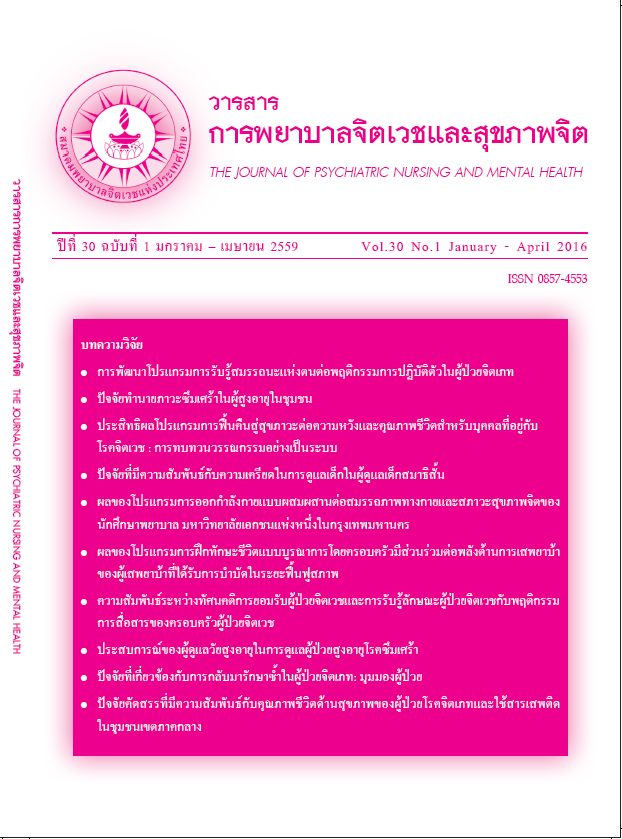ผลของโปรแกรมการฝึกทักษะชีวิตแบบบูรณาการโดยครอบครัวมีส่วนร่วมต่อพลังต้านการเสพยาบ้าของผู้เสพยาบ้าที่ได้รับการบำบัดในระยะฟื้นฟูสภาพ THE EFFECT OF INTEGRATED LIFE SKILLS TRAINING WITH FAMILY PARTICIPATION PROGRAM ON RESILIENCE OF AMPHETAMINE USERS RECEIVING
Main Article Content
บทคัดย่อ
Objectives: The objectives of this quasi-experimental pretest-posttest control groups design were to compare: 1) the pretest and posttest resilience to amphetamine use scores of amphetamine users in the experimental group who received integrated life skills training with family participation program and those in the control group who received regular treatment, and 2) the pretest and posttest resilience to amphetamine use scores between the study group and the control group after the experiment.
Methods: A total sample size of 40 subjects were amphetamine users receiving rehabilitation
treatment in outpatient unit of government hospital who met the inclusion criteria. The samples were matched pair by age, sex and then randomly assigned into experimental group and control group, 20 subjects in each group. The research instruments consisted of 1) The integrated life skills training with family participation program, 2) Resilience to amphetamine use questionnaire, 3) Self-control and life skills and the perception about drug questionnaire, 4) Family participation of amphetamine use questionnaire, and 5) Demo -graphic questionnaire. The reliability of the 2nd, 3rd, and 4th instruments were reported by Cronbach Alpha as of .95, .75 and .72 respectively. The t-test was used for data analysis.
Results:Major findings were as follows:1. The mean scores of resilience to amphetamine use of amphetamine users after receiving the integrated life skills training with family participation program was significantly higher than those before at .01 (t = 11.62) 2. The mean scores of resilience to amphetamine use of amphetamine users after receiving the integrated life skills training with family participation program was significantly higher than those who received the regular caring activities at .01 (t = 12.02)
วัตถุประสงค์: การวิจัยครั้งนี้เป็นการวิจัยกึ่งทดลองแบบสองกลุ่มวัดก่อนและหลังการทดลอง มีวัตถุประสงค์เพื่อเปรียบเทียบ 1) พลังต้านการเสพยาบ้าก่อนและหลังการทดลองของผู้เสพยาบ้าในกลุ่มทดลองที่ได้รับโปรแกรมการฝึกทักษะชีวิตแบบบูรณาการโดยครอบครัวมีส่วนร่วม และกลุ่มควบคุมที่ได้รับการดูแลตามปกติ 2) พลังต้านการเสพยาบ้าในผู้เสพยาบ้าระหว่างกลุ่มที่ได้รับโปรแกรมการฝึกทักษะชีวิตแบบบูรณาการโดยครอบครัวมีส่วนร่วม กับกลุ่มควบคุมที่ได้รับการดูแลตามปกติ
วิธีการศึกษา:กลุ่มตัวอย่างจำนวน 40 ราย ซึ่งเป็นผู้เสพยาบ้าที่ได้รับการบำบัดในระยะฟื้นฟูสภาพ แผนกผู้ป่วยนอก โรงพยาบาลของรัฐ และมีคุณสมบัติตามเกณฑ์ ได้รับการจับคู่ด้วยอายุ เพศ และสุ่มเข้ากลุ่มทดลอง และกลุ่มควบคุม กลุ่มละ 20 ราย เครื่องมือที่ใช้ในการวิจัยคือ 1) โปรแกรมการฝึกทักษะชีวิตแบบบูรณาการโดยครอบครัวมีส่วนร่วม 2) แบบประเมินพลังต้านการเสพยาบ้า 3) แบบวัดการควบคุมตนเอง ทักษะชีวิต และการรับรู้เกี่ยวกับยาเสพติด 4) แบบวัดการมีส่วนร่วมของครอบครัวผู้เสพยาบ้า 5) แบบสอบถามข้อมูลประชากร เครื่องมือทุกชุดผ่านการตรวจความตรง เชิงเนื้อหาจากผู้ทรงคุณวุฒิจำนวน 5 ท่าน เครื่องมือชุดที่ 2, 3 และ 4 มีค่าความเที่ยงอัลฟา ของครอนบาค เท่ากับ .95, .75 และ .72 ตามลำดับ วิเคราะห์ข้อมูลโดยใช้สถิติที
ผลการศึกษา: ผลการวิจัยสรุปได้ดังนี้ 1. คะ แนนเฉลี่ยพลังต้านการเสพยาบ้าของผู้เสพยาบ้า หลังได้รับโปรแกรมการฝึกทักษะชีวิตแบบบูรณาการโดยครอบครัวมีส่วนร่วม ในกลุ่มทดลองสูงกว่าก่อนได้รับโปรแกรมฯ อย่างมีนัยสำคัญทางสถิติที่ระดับ .01 (t= 11.62) 2. คะแนนเฉลี่ยพลังต้านการเสพยาบ้า ในกลุ่มทดลองที่ได้รับโปรแกรมการฝึกทักษะชีวิตแบบบูรณาการโดยครอบครัวมีส่วนร่วม สูงกว่ากลุ่มควบคุมที่ได้รับการดูแลตามปกติอย่างมีนัยสำคัญทางสถิติ ที่ระดับ .01 (t= 12.02)
Article Details
บทความที่ได้รับการตีพิมพ์แล้ว เป็นลิขสิทธิ์ของสมาคมพยาบาลจิตเวชแห่งประเทศไทย


